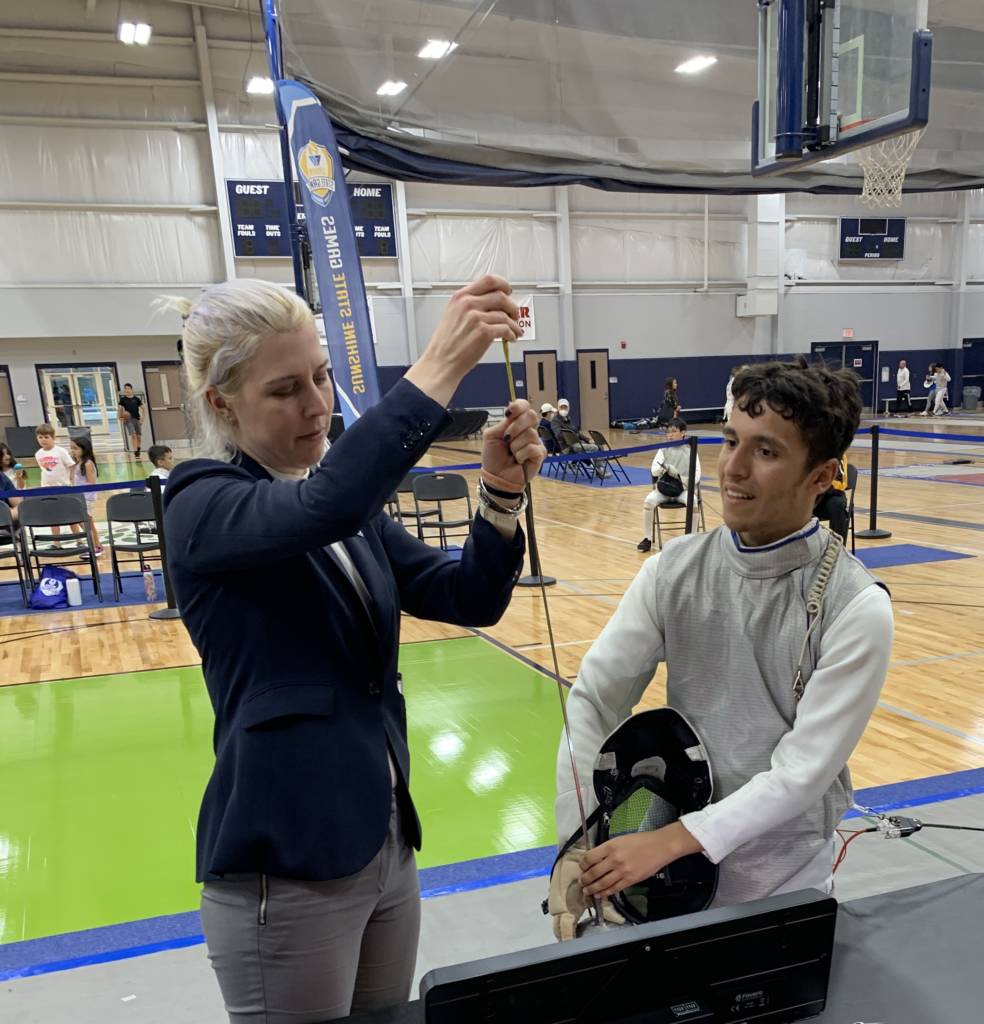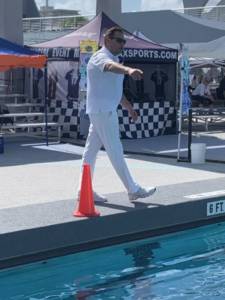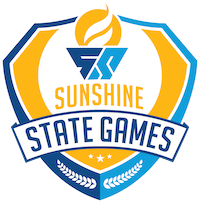
Sunshine State Games Officials Prepare Athletes for Future Competitions
For many of Florida’s Finest Amateur Athletes the annual Sunshine State Games, with many events held in June, it serves as a warm up for National and International competitions later in the summer.
For instance, the Sunshine State Games Artistic Swimming Championships, held June 7-9, offered athletes one final test in the pool, before heading to the US Artistic Swimming Junior Olympic Championships, in Gresham, Oregon, June 29-July 6.
The SSG Fencing Championships, held the same weekend, gave athletes one last opportunity on the strips before heading the USA Fencing Championships, on Columbus, Ohio, June 29-July 8.
More than just an opportunity to tweak their talents before heading out to larger competitions, it’s a chance to learn what they’re doing correctly and incorrectly to improve their game.
How is that measured? By the many experience officials the Sunshine State Games employs, not only to run a smooth competition, but to offer teaching moments to athletes on their way to greener pastures within their sport.
The annual Sunshine State Games budget includes travel, lodging and payment for official’s service during competition, according to Florida Sports Foundation Director of Amateur Sports, OJ Hill.
Some of the more prominent sports requiring officials include Artistic Swimming, Fencing, Figure Skating, Taekwondo and Water Polo.
“The budget for Sunshine State Games officials is into six figures,” Hill said.
But the expense is well worth it when Miami’s Ashleigh Johnson walks into the 2024 Olympic Games Opening Ceremonies wearing the red, white and blue with the USA Women’s Water Polo team. Or when Lakeland’s Kenny Gaudet, now among the top male Artistic Swimmers in the world, represents the U.S. at the World Aquatics Championships.
At a statewide event with athletes of all skill levels, the job of an official at the Sunshine State Games, is not something fast-tracked, or to be taken lightly.
“We had 40 officials for the Sunshine State Games Figure Skating,” said sport director Bonnie Boaz. “The majority, this year, were from Florida. We had many of the officials with 10 years+ and a few with 15-30 years+ experience.”
Each sport requires certification from a U.S. Governing Body, needing renewal on a regular basis, along with other types of training and knowledge of the sport and its community.
“All officials need a certification from USA Fencing,” said Lindsay Stapleton, an administrative staff member and official at the Sunshine State Games Fencing Championships. “This requires passing a written and practical test, working at various levels. All must pass a background check, do safe sport training and more to maintain compliance.”
The Sunshine State Games Fencing Sport Director, Bill Becker, is one of the most experienced referees in the USA and one of 5 elite referees voted as best in the world by top coaches and athletes internationally. He also traveled with the international team as a referee for Sabre for many years.
Many referees start as athletes within their sport and continue to be involved in the sport in different ways. In Taekwondo, referees and judges begin at local events. Younger judges typically run the computer systems before aging up and being allowed to work in the ring, according to Deborah White, an official and administrator for Sunshine State Games Taekwondo.
“They do not need to be a “Master”, but must be a black belt and at least the age of 16 to work in the ring,” White said. “A lay person is not permitted in these roles, as having an intimate knowledge of the art allows for proper conduct by the officials.”
 The 2024 Sunshine State Games Taekwondo Championships had five Internationally certified referees working the event. Three were certified in both Poomsae (forms/patterns) and Kyorugi (sparring), two certified in Kyorugi only, and one who is also a Vice Chair for USA Taekwondo, our national governing body charged with facilitating our 2024 Olympic Team for Taekwondo.
The 2024 Sunshine State Games Taekwondo Championships had five Internationally certified referees working the event. Three were certified in both Poomsae (forms/patterns) and Kyorugi (sparring), two certified in Kyorugi only, and one who is also a Vice Chair for USA Taekwondo, our national governing body charged with facilitating our 2024 Olympic Team for Taekwondo.
Being a referee is one of the “Best” seats in the house for witnessing the action up close and in person, other than being a competitor or coach.
“It’s a thankless position, but one all referees and judges cherish,” said White. “To be a part of someone’s dream of becoming a champion, there is something each of us takes pride in helping them achieve.”
Somewhere in the back corner of a Florida sports facility during the month of June, there’s sure to be a referee smiling while watching a young athlete climb to the top of the medal stand. They may comment to someone nearby, “keep an eye on that kid.”
Or they may just continue to smile know what they’re helping them achieve.






